So, you’ve decided to move to Thailand—or you’re seriously thinking about it. But now comes the big question: where should you live? With so many different regions offering such varied experiences, choosing the right place can be challenging. Thailand isn’t just one thing—it’s a mix of modern cities, quiet rural towns, tropical islands, and everything in between. Whether you’re looking for fast-paced city life, a laid-back beach vibe, or a peaceful escape surrounded by nature, there’s a part of Thailand that fits the bill.
But what works for one person might not work for another. Your ideal location will depend on a few key factors—your lifestyle preferences, budget, climate tolerance, and what kind of community and daily rhythm you’re looking for. In this guide, we’ll explore some of the best places to live in Thailand. You’ll get a sense of what each location has to offer, the pros and cons, and who each place might be best suited for—so you can make a confident decision about where to begin your new life in Thailand.
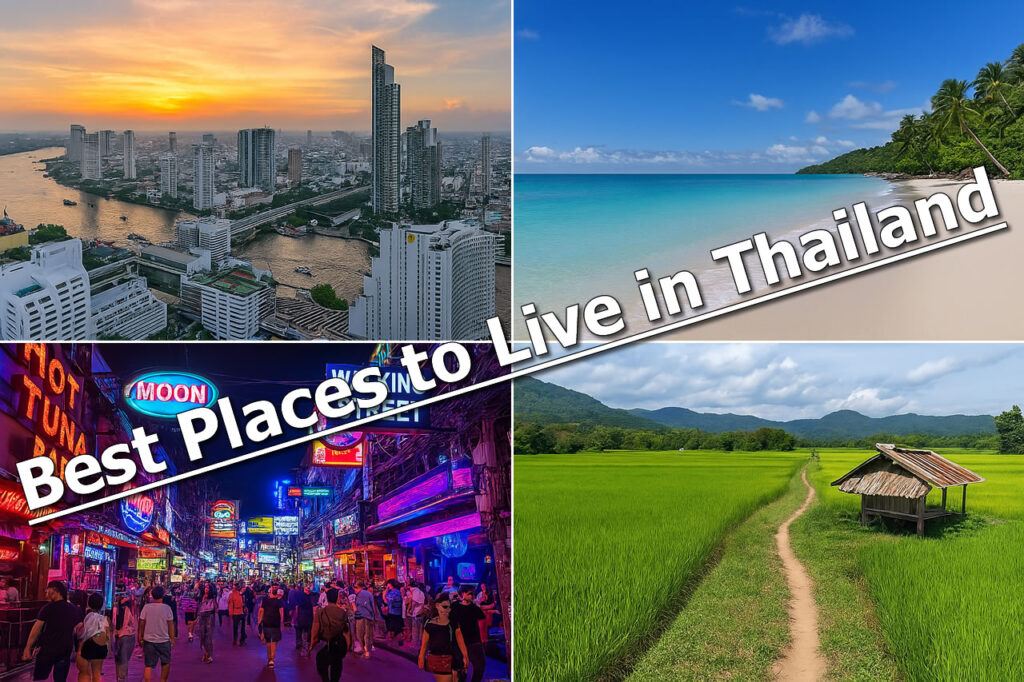
What to Consider Before Choosing a Place to Live
Here are some key factors to help guide your decision:
1. Cost of Living
Not all areas in Thailand are priced the same. Big cities like Bangkok and Phuket come with higher living costs, especially when it comes to rent and dining out. Smaller cities and rural areas, on the other hand, offer a much lower cost of living. Think about your monthly budget and the kind of lifestyle you want—do you need luxury condos and imported groceries, or are you happy with a modest apartment and local markets?
2. Lifestyle and Daily Routine
Are you looking for an active social scene with restaurants, nightlife, and entertainment? Or do you prefer peace, quiet, and nature? Some places are better suited for remote workers and entrepreneurs, while others are ideal for retirees or families with kids. Consider how you want your average day to look.
3. Climate and Air Quality
Thailand is hot and humid year-round, but there are regional differences. The north has cooler winters but also suffers from seasonal air pollution (Burning Season). Coastal areas are humid but often get fresh sea breezes. If you have health concerns or are sensitive to pollution, this is something to seriously think about.
4. Transportation and Mobility
Do you plan to use public transport, drive a car, or ride a motorbike? Big cities like Bangkok have excellent public transit systems, but smaller towns may require your own vehicle. Also, consider traffic—some places are notorious for it, which can impact your quality of life.
5. Community and Social Life
Do you want to be surrounded by a large expat community, or are you hoping to integrate more with the local Thai culture? Some areas attract digital nomads, others are popular with retirees, and some are more local and traditional. It helps to know what kind of community you’ll feel most comfortable in.
6. Healthcare and Education
Access to good healthcare is crucial, especially if you’re planning a long-term stay. Thailand has excellent hospitals, but they’re concentrated in major cities. If you have children, you’ll also want to check the availability of international schools, especially outside of Bangkok or Chiang Mai.
7. Connectivity and Accessibility
If you plan to travel often—within Thailand or internationally—proximity to a major airport is a big plus. Bangkok, Chiang Mai, and Phuket have international airports with frequent connections. Remote areas may offer tranquility but require more effort to get in and out of.
Once you’ve thought about these factors, you’ll have a clearer picture of what kind of place suits you best. In the next section, we’ll take a closer look at the top places to live in Thailand—and what each one offers.
Where to Live in Thailand: A Region-by-Region Breakdown
Bangkok – For the City Lovers
Bangkok is Thailand’s capital and its economic, cultural, and commercial engine. It’s a city that never really stops moving—a true metropolis of over 12 million people where tradition meets modernity. For expats who thrive on convenience, global connections, and an active lifestyle, Bangkok offers more than anywhere else in the country.
1. Cost of Living
- Accommodation: Bangkok has one of the widest price ranges for housing in Thailand. You can find small studio apartments for around 8,000–12,000 THB/month, or luxury condos with city views for 50,000 THB and up.
- Day-to-Day Expenses: Street food is cheap (40–70 THB per meal), but international dining, imported goods, and nightlife can add up. It’s possible to live comfortably on 40,000–60,000 THB/month, but higher-end lifestyles can push that over 100,000 THB.
- Healthcare: Some of Thailand’s best hospitals are in Bangkok, offering high-quality care that meets international standards. Private healthcare is more expensive here than in rural areas, but still affordable compared to Western countries.
2. Lifestyle Preferences
- Pace of Life: Fast-paced and full of activity. Perfect if you enjoy being in the center of it all.
- Social Scene: A large and diverse expat community, with everything from coworking spaces and language exchanges to meetups and networking events.
- Access to Nature: Limited within the city, but parks like Lumpini and Benjakitti offer green space. For weekend escapes, beaches or national parks are 2–3 hours away.
3. Climate and Weather
- Air Quality: Bangkok suffers from poor air quality during the dry season (Jan–April). It’s not as severe as Chiang Mai’s burning season but still a concern.
- Temperature and Humidity: Hot and humid year-round. Urban heat is amplified by concrete and traffic, with very little seasonal relief.
4. Transportation
- Public Transport: One of the city’s biggest advantages. The BTS Skytrain and MRT subway are clean, fast, and reliable. Grab, taxis, canal boats, and motorbike taxis are widely available.
- Traffic: Notorious. If you need to be somewhere during rush hour, it’s best to use the BTS or MRT.
- Proximity to Airports: Two major airports (Suvarnabhumi and Don Mueang) provide easy access to both domestic and international travel.
5. Healthcare and Education
- Healthcare Access: Excellent. Home to world-class hospitals like Bumrungrad and Samitivej. Plenty of English-speaking doctors and specialists.
- International Schools: Bangkok has the highest concentration of international schools in the country, with a wide range of curricula and tuition levels.
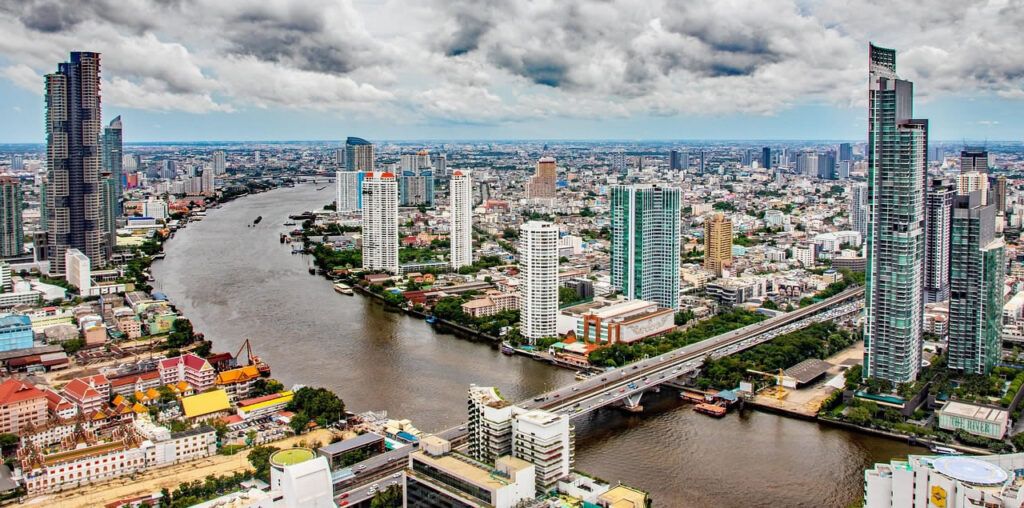
6. Cultural Fit
- Local vs. Expat Communities: Highly international, especially in neighborhoods like Sukhumvit, Sathorn, and Ari. Still plenty of opportunities to engage with local Thai culture through festivals, temples, and traditional markets.
- Language and Integration: You can get by with English in many parts of the city, though learning Thai will deepen your experience and ease daily life.
7. Safety
- Crime Rates: Generally low for a city this size. Petty crime exists but violent crime is rare. Certain nightlife districts can feel rowdier but are still relatively safe.
- Natural Disasters: Flooding is an occasional issue during heavy rains, especially in older parts of the city.
8. Job and Business Opportunities
- Employment: Bangkok offers the best job market for expats—particularly in education, tech, finance, tourism, and international business.
- Business Environment: Excellent infrastructure and networking opportunities. Many foreigners run small businesses or work remotely from the city.
9. Tourism and Accessibility
- Tourist Crowds: Some parts of Bangkok are busy with tourists (Khao San Road, Chatuchak Market), but it’s easy to find quieter neighborhoods.
- Proximity to Other Destinations: Excellent. Weekend trips to the beach, the mountains, or even other countries are easily doable with Bangkok’s strong travel links.
10. Future Development and Growth
- Infrastructure Development: Ongoing. New train lines, commercial zones, and residential developments are constantly being built—great for convenience, but can also mean construction noise and urban sprawl.
- Investment Potential: Bangkok continues to attract both local and foreign investment. Certain areas, like Bang Na or Ratchada, are rapidly growing and may offer solid long-term potential for property buyers.
Summary:
Bangkok is the best choice for expats who want city life with all the comforts and conveniences of home. It’s a great base for professionals, digital nomads, families, and food lovers. While the pace can be intense and the air quality isn’t perfect, the opportunities, services, and social life more than make up for it.
Chiang Mai – For the Chill Vibe and Mountain Air
Chiang Mai is Thailand’s second-largest city, but it couldn’t feel more different from Bangkok. Nestled in the northern mountains, it offers a slower, more relaxed pace of life, a strong sense of culture, and an ever-growing expat community. It’s long been a favorite for retirees, creatives, and digital nomads looking for a better balance between cost, comfort, and quality of life.
1. Cost of Living
- Accommodation: Rent is significantly cheaper than in Bangkok. A modern one-bedroom condo in the city center can cost as little as 10,000–15,000 THB/month, while older apartments or places on the outskirts can go for even less.
- Day-to-Day Expenses: Local food, transportation, and services are very affordable. It’s possible to live well in Chiang Mai for 30,000–50,000 THB/month, depending on lifestyle.
- Healthcare: Chiang Mai has several good private hospitals and clinics with English-speaking staff. While not as internationally renowned as Bangkok’s hospitals, they’re suitable for most medical needs.
2. Lifestyle Preferences
- Pace of Life: Much calmer and more manageable than Bangkok. Ideal for those who prefer a quieter, more community-oriented environment.
- Social Scene: A vibrant and welcoming expat scene, with meetups, workshops, and creative communities—especially in areas like Nimmanhaemin.
- Access to Nature: One of Chiang Mai’s biggest perks. Mountains, waterfalls, hiking trails, and national parks are just a short drive away.
3. Climate and Weather
- Air Quality: The biggest downside. From February to May, Chiang Mai experiences Burning Season, when surrounding farmland is cleared by fire. Air quality can reach hazardous levels, especially in March.
- Temperature and Humidity: Cooler than most of Thailand, especially in the evenings and during the dry season. Winters (Nov–Jan) can even be pleasantly cool.
4. Transportation
- Public Transport: Limited. No BTS or MRT—locals rely on songthaews (red trucks), Grab, motorbikes, or bicycles.
- Traffic: Generally light and manageable. You can cross town in 15–20 minutes.
- Proximity to Airports: Chiang Mai International Airport offers regular domestic and some international flights. It’s only about 10–15 minutes from the city center.
5. Healthcare and Education
- Healthcare Access: Several reputable hospitals and private clinics, such as Chiang Mai Ram and Bangkok Hospital Chiang Mai. Suitable for general care and many specialties.
- International Schools: Chiang Mai has a good range of international schools, making it a viable choice for families. Options include British, American, and Montessori curricula.
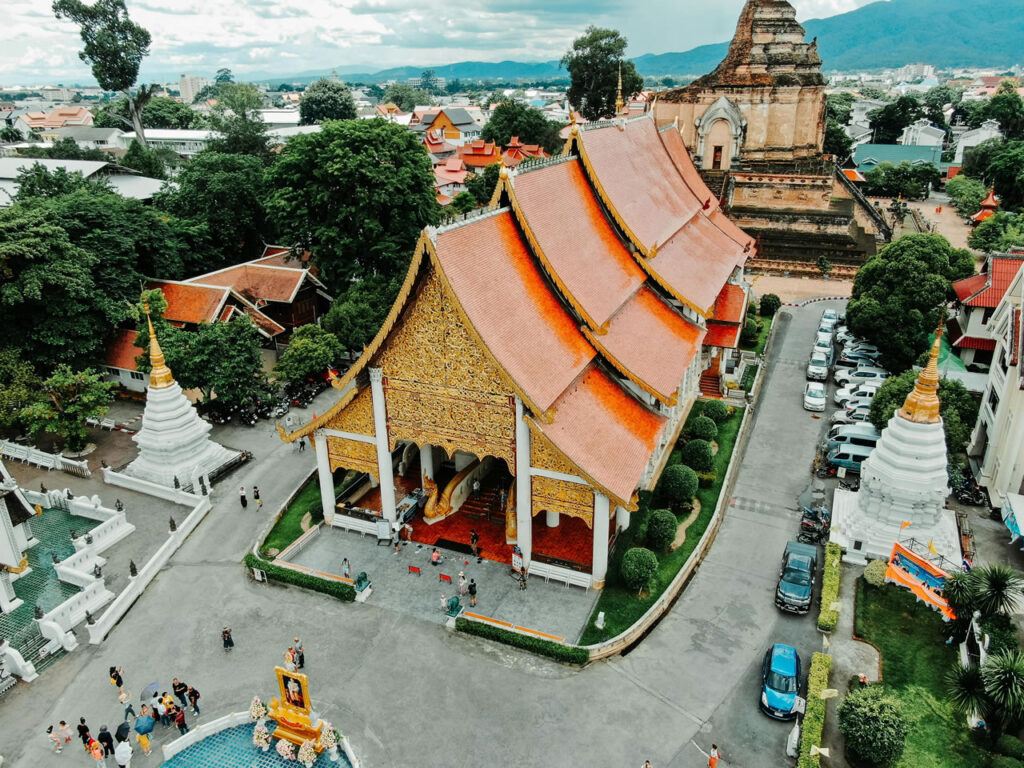
6. Cultural Fit
- Local vs. Expat Communities: Strong expat community, but the city retains a very Thai cultural feel, especially in the Old City. It’s easy to engage with both.
- Language and Integration: Many locals speak some English, especially in tourist areas. But learning basic Thai goes a long way and is appreciated here.
7. Safety
- Crime Rates: Very low. Chiang Mai is considered one of the safest cities in Thailand.
- Natural Disasters: Occasional flooding during rainy season. Earthquakes are rare but have been recorded.
8. Job and Business Opportunities
- Employment: Not a major job market, but popular for remote workers and digital nomads. Teaching jobs are also available.
- Business Environment: Low-cost living and good internet make it attractive for freelancers, writers, designers, and online entrepreneurs.
9. Tourism and Accessibility
- Tourist Crowds: Popular with tourists, especially during festivals like Yi Peng (Lantern Festival), but less overwhelming than Bangkok or Phuket.
- Proximity to Other Destinations: Well-connected by air to Bangkok, Phuket, and international hubs like Singapore and Kuala Lumpur. Border trips to Laos and Myanmar are also doable.
10. Future Development and Growth
- Infrastructure Development: Growth is steady but not as rapid or disruptive as in Bangkok. Nimman and surrounding areas are modernizing quickly.
- Investment Potential: Real estate is affordable, but growth is moderate. Best for long-term living rather than short-term investment gains.
Summary:
Chiang Mai is a great fit for those seeking a slower pace, natural beauty, and strong community without sacrificing comfort or convenience. It’s affordable, friendly, and culturally rich. The one major trade-off is Burning Season—something to plan around or escape from if possible.
Phuket – For a Mix of Island Life and Amenities
Phuket is Thailand’s largest island and one of the most popular destinations for both tourists and expats. With its mix of beautiful beaches, modern infrastructure, and international amenities, it strikes a balance between tropical island living and urban convenience. While it can be more expensive than other parts of Thailand, many expats find the lifestyle well worth the cost.
1. Cost of Living
- Accommodation: Rental prices vary by area. Beachfront or upscale villas can go for 50,000–150,000 THB/month, while modest apartments further inland might cost 12,000–25,000 THB/month.
- Day-to-Day Expenses: Local markets and food stalls offer affordable options, but international groceries and upscale dining are pricier than in Chiang Mai or even Bangkok.
- Healthcare: Phuket has several private hospitals and clinics catering to expats and tourists, including Bangkok Hospital Phuket and Mission Hospital. Costs are higher than in smaller towns but lower than Western standards.
2. Lifestyle Preferences
- Pace of Life: More relaxed than Bangkok but busier than smaller islands. The atmosphere can vary significantly depending on the area—Patong is lively and touristy, while areas like Rawai or Kamala are quieter and more residential.
- Social Scene: Strong expat presence with a focus on wellness, boating, and outdoor activities. Plenty of gyms, yoga studios, restaurants, bars, and beach clubs.
- Access to Nature: Excellent. Beaches, waterfalls, islands, and jungle trails are all nearby. Perfect for diving, sailing, and other water sports.
3. Climate and Weather
- Air Quality: Generally better than Bangkok or Chiang Mai. Occasional seasonal haze, but not on the same level as northern Thailand’s Burning Season.
- Temperature and Humidity: Hot and humid year-round, with a pronounced rainy season from May to October.
4. Transportation
- Public Transport: Limited. No rail system—transport is mainly private cars, motorbikes, tuk-tuks, and taxis. Grab is available in most areas.
- Traffic: A common issue, especially during high season. Getting from one side of the island to the other can take over an hour.
- Proximity to Airports: Phuket International Airport offers direct flights to Bangkok, other parts of Thailand, and many regional and international destinations.
5. Healthcare and Education
- Healthcare Access: Very good. Several high-quality private hospitals and international clinics, including dental and cosmetic surgery centers.
- International Schools: Phuket has multiple international schools, including British and American curricula. Good options for families with children.
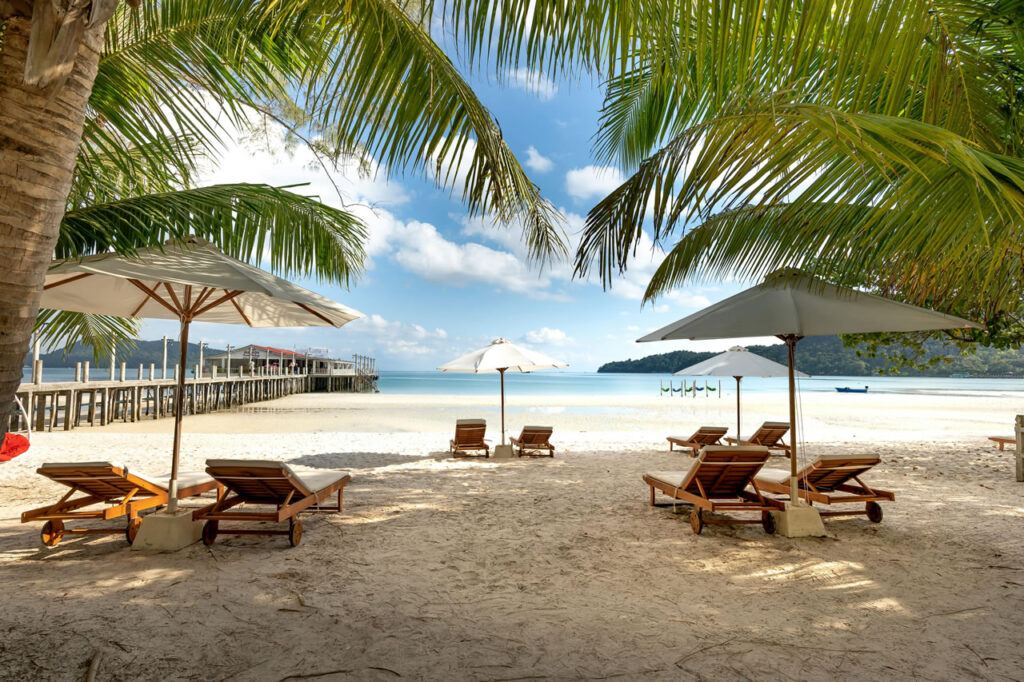
6. Cultural Fit
- Local vs. Expat Communities: Expats make up a visible portion of the population in many areas. Some neighborhoods feel very international, while others retain more of a local Thai atmosphere.
- Language and Integration: English is widely spoken in tourist zones and expat-heavy areas. Learning Thai is still beneficial for long-term integration.
7. Safety
- Crime Rates: Generally safe, though petty theft can occur in tourist areas. Some beach towns can feel overly commercial, especially in peak season.
- Natural Disasters: Phuket is in a tsunami risk zone, though early warning systems have improved. Heavy rain can lead to localized flooding.
8. Job and Business Opportunities
- Employment: Limited formal job market for foreigners, mostly centered around tourism, hospitality, wellness, and real estate.
- Business Environment: Many expats run small businesses in tourism, fitness, or F&B. The high tourist volume supports niche business ideas, though competition is stiff.
9. Tourism and Accessibility
- Tourist Crowds: Very high during peak season (Nov–Mar), especially in places like Patong. Quieter beaches and towns are still accessible.
- Proximity to Other Destinations: Excellent. Phuket is a jumping-off point for exploring the Andaman Sea, with easy access to nearby islands like Phi Phi, Krabi, and Phang Nga.
10. Future Development and Growth
- Infrastructure Development: Ongoing. New roads, shopping centers, and residential projects are constantly in development, particularly in the northern part of the island.
- Investment Potential: High tourist demand and continued development make it attractive for property investors, though prices are already elevated compared to other regions.
Summary:
Phuket offers the best of both worlds—tropical island scenery with a touch of urban comfort. It’s ideal for expats who want a beach lifestyle but still need reliable infrastructure, international schools, and healthcare. While more expensive and busier than other islands, the balance of lifestyle, nature, and services makes Phuket a strong contender for long-term living.
Koh Samui – For the Laid-Back Island Dream
Koh Samui, located in the Gulf of Thailand, offers a more relaxed and intimate island experience than Phuket—while still providing enough infrastructure and amenities for long-term living. Known for its palm-fringed beaches, scenic mountain roads, and strong sense of community, it attracts expats who value lifestyle over hustle. If you’re looking to slow things down without giving up too much comfort, Samui might be your place.
1. Cost of Living
- Accommodation: Mid-range apartments or houses start around 12,000–20,000 THB/month. Beachfront villas or high-end pool homes can range from 40,000 to over 100,000 THB/month.
- Day-to-Day Expenses: Local food is inexpensive, but imported goods and dining in tourist areas can increase your monthly spend. A comfortable budget ranges from 35,000–70,000 THB/month, depending on lifestyle.
- Healthcare: Samui has a few private hospitals and international clinics. For complex care, you may need to travel to Bangkok or Surat Thani.
2. Lifestyle Preferences
- Pace of Life: Slower and more peaceful than larger cities or Phuket. Perfect for those who prioritize wellness, nature, and community over nightlife or career growth.
- Social Scene: A friendly and tight-knit expat community, especially in areas like Bophut, Maenam, and Lamai. Popular with digital nomads, wellness practitioners, retirees, and remote workers.
- Access to Nature: Excellent. Samui is surrounded by beaches, waterfalls, jungle hikes, and offers easy access to marine parks and nearby islands like Koh Phangan and Koh Tao.
3. Climate and Weather
- Air Quality: Generally good year-round. Occasional haze can drift over from the mainland during the burning season but is far less severe than in Chiang Mai.
- Temperature and Humidity: Hot and humid year-round, with the wettest months typically from October to December. Temperatures are consistent, with cooling sea breezes in coastal areas.
4. Transportation
- Public Transport: Very limited. Most expats use motorbikes or rent/own cars. A ring road circles the island, but traffic can be slow during high season.
- Traffic: Not as bad as Phuket, but congestion is growing—especially around Chaweng and Fisherman’s Village.
- Proximity to Airports: Samui Airport offers direct flights to Bangkok and some international destinations. Flights are more expensive due to private airport ownership and limited carriers.
5. Healthcare and Education
- Healthcare Access: Basic care is easily accessible, with several private clinics and smaller hospitals on the island. Bangkok Hospital Samui is the top choice for expats.
- International Schools: A handful of good international schools with British and Montessori-style education. Suitable for families, though options are more limited compared to Bangkok or Phuket.
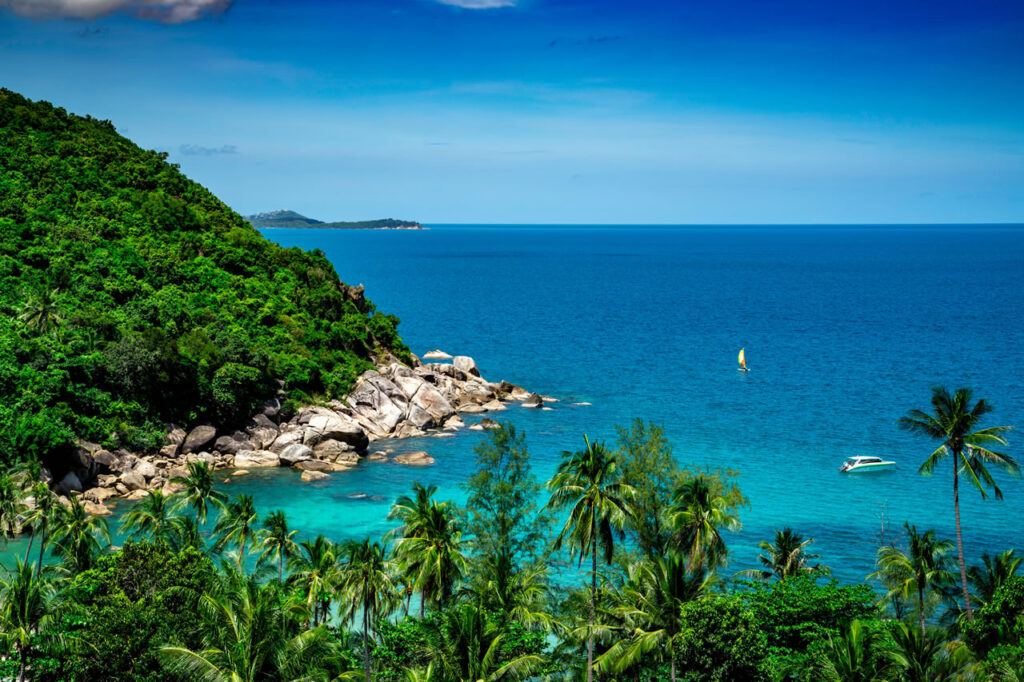
6. Cultural Fit
- Local vs. Expat Communities: A strong and visible expat presence. Some areas feel very international, while others still retain a relaxed local feel.
- Language and Integration: Many locals speak basic English, especially in service areas. The pace and size of the island make cultural integration more approachable for those who want it.
7. Safety
- Crime Rates: Low. Samui is generally safe, with occasional petty theft in touristy zones.
- Natural Disasters: Flooding can happen during heavy rains. As with other islands, vulnerability to tropical storms exists but major events are rare.
8. Job and Business Opportunities
- Employment: Limited. Most expats working here are involved in tourism, wellness, or work remotely.
- Business Environment: Popular with wellness entrepreneurs (yoga, fitness, retreats) and small hospitality ventures. The community leans toward lifestyle-first business thinking.
9. Tourism and Accessibility
- Tourist Crowds: Present, but more manageable than Phuket or Pattaya. Busy during holiday periods, but many quiet spots remain throughout the island.
- Proximity to Other Destinations: Well-connected by ferry to Koh Phangan, Koh Tao, and the mainland. Flights to Bangkok are frequent, but international access is limited and often pricey.
10. Future Development and Growth
- Infrastructure Development: Steady growth with new resorts, cafés, and housing developments. Road expansion and upgrades are ongoing.
- Investment Potential: Moderate to high in select areas. Property prices are rising, especially in popular expat zones, but it’s still more affordable than Phuket.
Summary:
Koh Samui is ideal for expats who want a slower pace, tropical scenery, and a strong sense of community—without completely giving up on modern conveniences. While it’s not the place to build a corporate career, it’s a fantastic option for remote workers, lifestyle-focused individuals, and those seeking balance between nature and comfort.
Hua Hin – For Retirees and Family Life
Located just a few hours south of Bangkok, Hua Hin is a relaxed seaside town that’s long been a favorite getaway for Thai royalty—and increasingly, for retirees and families. With its wide beaches, peaceful neighborhoods, golf courses, and growing expat community, Hua Hin offers a quieter, more stable lifestyle without sacrificing too many urban comforts.
1. Cost of Living
- Accommodation: Housing is very affordable compared to Bangkok or the islands. You can rent a modern condo or small house for 10,000–20,000 THB/month. Larger homes in gated communities with pools go for 25,000–50,000 THB/month.
- Day-to-Day Expenses: Eating out, shopping at local markets, and basic services are all reasonably priced. Monthly budgets of 30,000–60,000 THB are common among expats living comfortably.
- Healthcare: Hua Hin has good private clinics and hospitals, with competent care for routine medical needs. For specialized treatment, some expats travel to Bangkok.
2. Lifestyle Preferences
- Pace of Life: Calm, quiet, and easy-going. Ideal for those who want to slow down, enjoy the outdoors, and avoid the crowds.
- Social Scene: Less vibrant than Bangkok or Chiang Mai, but growing. There are cafes, wine bars, community events, and fitness groups—mostly centered around retirees and long-term residents.
- Access to Nature: Excellent. Long beaches, national parks, hiking trails, and countryside are all nearby. Great for golf, cycling, and beach walks.
3. Climate and Weather
- Air Quality: Generally good, especially compared to northern cities. Hua Hin is not affected by Burning Season and rarely experiences major pollution spikes.
- Temperature and Humidity: Hot and humid, especially between March and May. The sea breeze helps, and the climate is considered mild compared to other parts of Thailand.
4. Transportation
- Public Transport: Limited. Most people use private cars or motorbikes to get around.
- Traffic: Minimal by Thai standards. Getting across town usually takes 10–20 minutes.
- Proximity to Airports: No international airport yet, though one is under development. Bangkok’s Suvarnabhumi Airport is about 3 hours away by car.
5. Healthcare and Education
- Healthcare Access: Good quality for everyday needs. Bangkok Hospital Hua Hin and San Paulo Hospital are popular among expats.
- International Schools: Several good international schools make Hua Hin suitable for families, with British and bilingual curricula available.
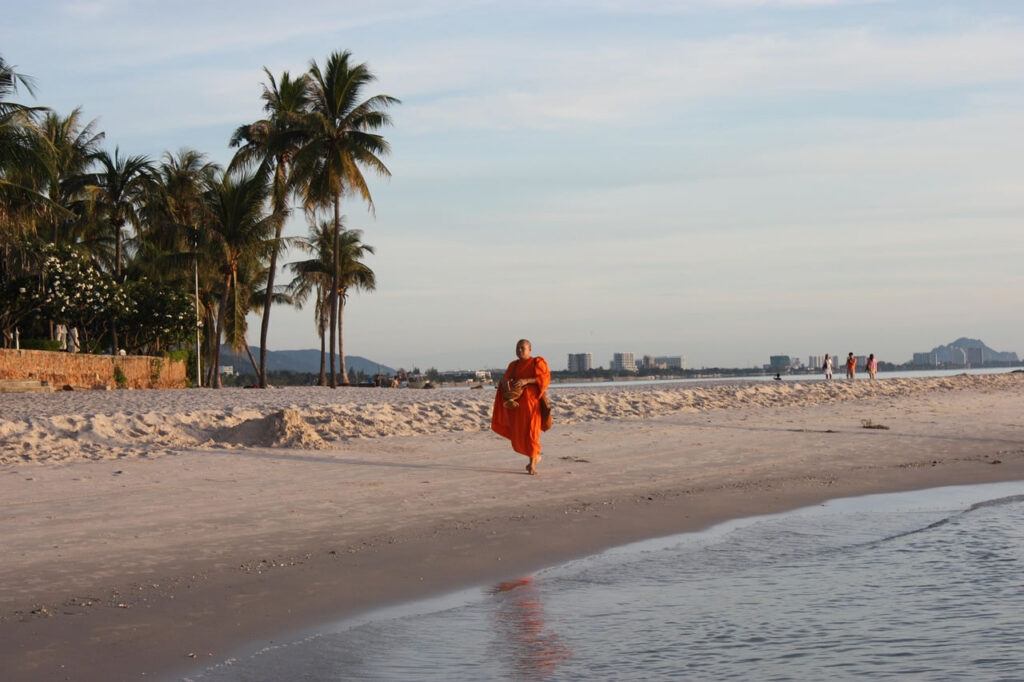
6. Cultural Fit
- Local vs. Expat Communities: Expats are a visible part of the community but don’t dominate. Hua Hin retains a strong Thai identity with a more low-key integration of foreign residents.
- Language and Integration: English is spoken in many places, especially in the service industry. Learning Thai will enhance your experience but isn’t strictly necessary for day-to-day life.
7. Safety
- Crime Rates: Very low. Hua Hin is considered one of the safest towns in Thailand.
- Natural Disasters: Minimal risk. Occasionally affected by seasonal storms but generally protected from extreme weather.
8. Job and Business Opportunities
- Employment: Limited. Most foreigners here are retired or work remotely. Jobs for expats are rare unless you own a business.
- Business Environment: Small-scale opportunities exist in hospitality, wellness, or tourism-related services, but the market is niche.
9. Tourism and Accessibility
- Tourist Crowds: Much less crowded than Phuket or Pattaya. Hua Hin is more popular with domestic tourists, giving it a more authentic, everyday Thai feel.
- Proximity to Other Destinations: Easy weekend trips to Bangkok and nearby coastal towns like Cha-Am and Pranburi.
10. Future Development and Growth
- Infrastructure Development: Ongoing improvements, including a planned high-speed train line and airport expansion, could increase accessibility and investment appeal.
- Investment Potential: Stable, with moderate growth. Real estate is affordable and appeals to long-term buyers rather than short-term investors.
Summary:
Hua Hin is perfect for those seeking a quiet, affordable, and family-friendly lifestyle. With good healthcare, safe neighborhoods, and access to nature, it’s especially popular among retirees and families with young children. While it may lack the buzz of bigger cities, its peaceful charm is what draws people in—and keeps them there.
Pattaya – For the Party-Goers and Digital Nomads
Pattaya, located just 90 minutes from Bangkok, is one of Thailand’s most well-known coastal cities. Originally a quiet fishing village, it has grown into a lively city known for its nightlife, beachfront lifestyle, and surprisingly affordable living. While it still has a reputation as a party town, Pattaya has also evolved into a hub for remote workers, retirees, and expats looking for an energetic yet budget-friendly place to settle.
1. Cost of Living
- Accommodation: Pattaya offers great value for money. Studio apartments can be found for 8,000–15,000 THB/month, while sea-view condos or houses in expat-friendly neighborhoods range from 20,000 to 50,000 THB/month.
- Day-to-Day Expenses: Street food, shopping, and local services are inexpensive. You can live comfortably on 30,000–60,000 THB/month, depending on your lifestyle.
- Healthcare: Pattaya has several well-equipped private hospitals, including Bangkok Hospital Pattaya and Pattaya International Hospital. Prices are reasonable, and service is geared toward expats and retirees.
2. Lifestyle Preferences
- Pace of Life: Active and energetic, especially in central areas. There’s always something going on—whether that’s a live music night, beach event, or networking meetup.
- Social Scene: One of the liveliest in Thailand. A mix of digital nomads, retirees, and long-term expats from around the world.
- Access to Nature: Better than expected. Nearby islands like Koh Larn offer clean beaches and calm escapes. The surrounding countryside also has golf courses, vineyards, and parks.
3. Climate and Weather
- Air Quality: Generally fair, though occasional spikes happen due to traffic and regional pollution. Better than Bangkok but not as clean as coastal towns like Hua Hin.
- Temperature and Humidity: Hot and humid year-round, with a rainy season from May to October. Sea breezes provide some relief.
4. Transportation
- Public Transport: Songthaews (shared pickup trucks) are the main form of local transport and very affordable. Motorbike taxis and Grab are also widely available.
- Traffic: Can be busy in central Pattaya and along the beach road, especially during holidays and weekends.
- Proximity to Airports: U-Tapao Airport is nearby for domestic flights. Suvarnabhumi Airport in Bangkok is about 1.5–2 hours away by car.
5. Healthcare and Education
- Healthcare Access: Very good, with modern hospitals and clinics catering to foreign residents.
- International Schools: Several international schools and bilingual programs make Pattaya suitable for families, though it’s not as well-known for education as Bangkok or Chiang Mai.
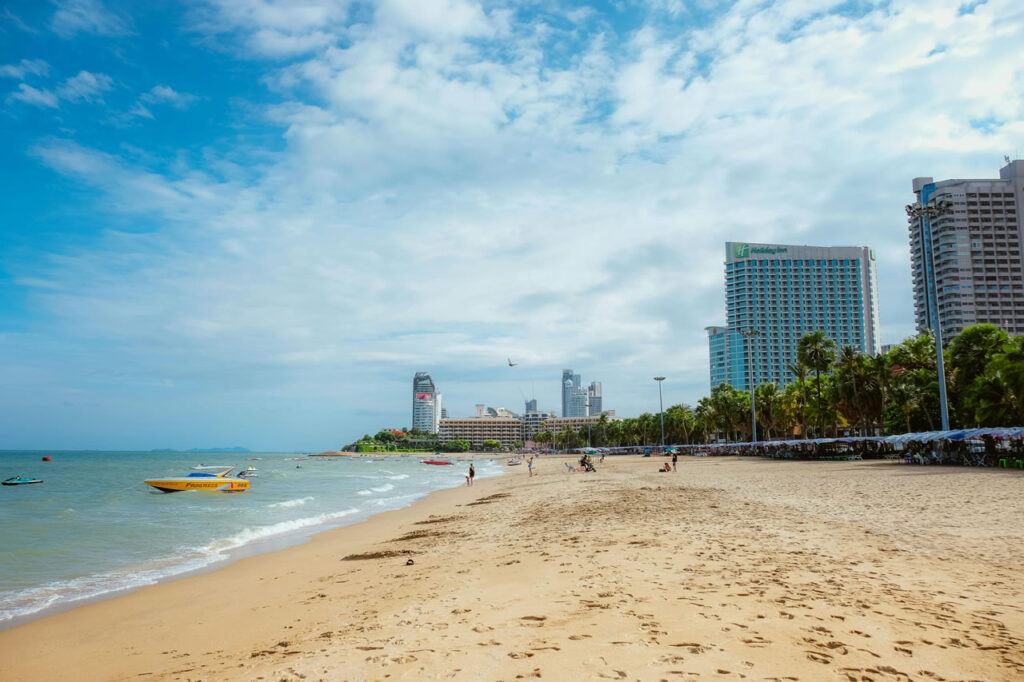
6. Cultural Fit
- Local vs. Expat Communities: Large and visible expat presence, especially in Jomtien and Pratumnak. The city has a more international feel, but still retains Thai cultural elements in local markets and festivals.
- Language and Integration: English is widely spoken in Pattaya. It’s one of the easiest cities in Thailand for non-Thai speakers to get by.
7. Safety
- Crime Rates: Generally safe, though the nightlife scene can bring occasional petty crime or scams. Use common sense, especially in bar areas.
- Natural Disasters: Low risk. Occasional flooding during storms, but rarely severe.
8. Job and Business Opportunities
- Employment: Some opportunities in tourism, real estate, and hospitality. It’s also a good base for remote workers and online entrepreneurs.
- Business Environment: Lots of small businesses are expat-owned. Café culture, coworking spaces, and serviced offices are growing, especially in areas catering to digital nomads.
9. Tourism and Accessibility
- Tourist Crowds: Still a major tourist destination, though numbers have diversified. Expect more families and long-stay visitors, not just short-term partygoers.
- Proximity to Other Destinations: Close to Bangkok, making it easy for weekend trips or quick airport runs. Also a launching point for visiting Koh Samet and other eastern islands.
10. Future Development and Growth
- Infrastructure Development: Ongoing improvements to public transport and roads. The Eastern Economic Corridor (EEC) project may further boost the area’s long-term appeal.
- Investment Potential: Attractive for property investment, with relatively low prices and steady rental demand. Be aware of zoning laws and foreign ownership regulations.
Summary:
Pattaya is ideal for expats who want a mix of affordability, excitement, and convenience. It’s well-suited to digital nomads, single retirees, and those who enjoy a lively social scene. While it’s not the quietest or most scenic spot in Thailand, its accessibility, infrastructure, and expat-friendly vibe make it a practical and enjoyable place to live.
📌 Planning a trip? Check out my full Pattaya Travel Guide with details on beaches, where to stay, and how to get there.
Rural Thailand – For the Ultra-Cheap, Slow Lifestyle
Beyond Thailand’s major cities, beach resorts, and tourist hubs lies a vast and often-overlooked part of the country: rural Thailand. From sleepy mountain towns in the north to quiet coastal villages in the south, these lesser-known areas offer a completely different experience—one centered around simplicity, local culture, and incredibly low living costs. It’s not for everyone, but for the right person, rural Thailand offers a peaceful and highly affordable way of life.
1. Cost of Living
- Accommodation: Some of the cheapest in the country. A three-bedroom home in a small town might rent for as little as 5,000–8,000 THB/month. Home ownership is also more accessible (for those with Thai spouses).
- Day-to-Day Expenses: Daily costs are minimal. Fresh local food, transportation, and services cost significantly less than in urban areas. Monthly budgets of 20,000–35,000 THB are realistic for comfortable living.
- Healthcare: Basic clinics and government hospitals are available, but for specialized care, you may need to travel to the nearest city.
2. Lifestyle Preferences
- Pace of Life: Extremely slow and relaxed. Ideal for those who prefer solitude, routine, and a deep connection with their surroundings.
- Social Scene: Minimal expat presence in most areas. Social life revolves around local events, markets, and relationships with Thai neighbors.
- Access to Nature: Excellent. Many rural areas are surrounded by farmland, forests, rivers, or beaches. Outdoor activities like hiking, fishing, and gardening are part of daily life.
3. Climate and Weather
- Air Quality: Varies by region. Rural areas in the north are heavily affected by Burning Season (Feb–Apr), while southern coastal areas generally have cleaner air.
- Temperature and Humidity: Northern regions may be cooler in winter. Southern and central rural areas are hot and humid year-round.
4. Transportation
- Public Transport: Very limited. A personal vehicle—motorbike or car—is essential.
- Traffic: Rarely an issue. Roads are quiet and travel times are short within local areas.
- Proximity to Airports: Often several hours away from the nearest domestic or international airport.
5. Healthcare and Education
- Healthcare Access: Local clinics and regional hospitals can handle routine care, but you’ll need to travel for advanced treatment.
- International Schools: Typically not available in rural areas. Families with children usually consider larger cities if schooling is a priority.
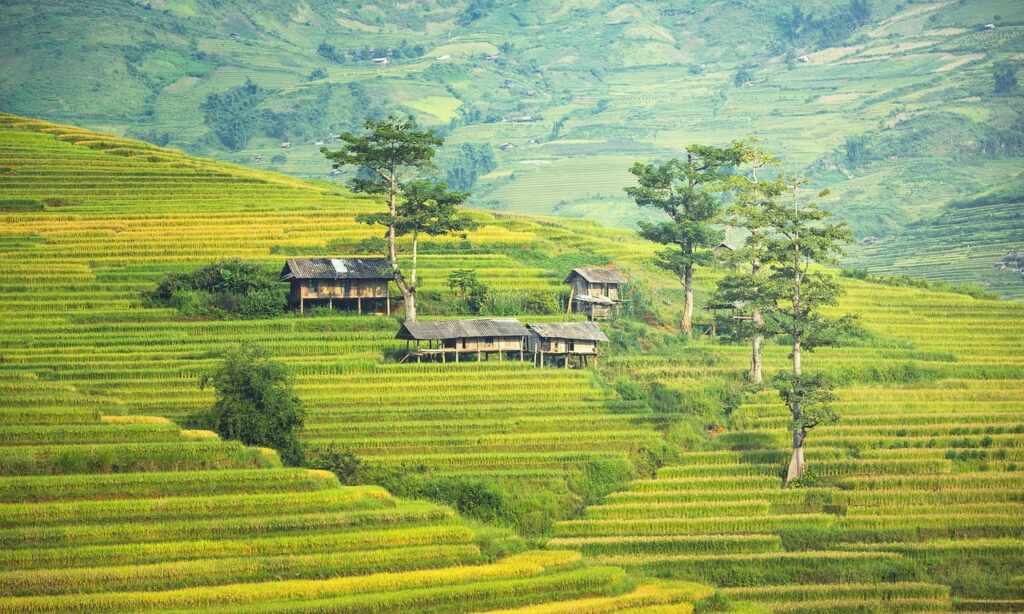
6. Cultural Fit
- Local vs. Expat Communities: Heavily local. You may be one of very few foreigners in town.
- Language and Integration: Basic Thai is often essential, especially in areas where English is rarely spoken. Cultural immersion is deep and rewarding for those who are open to it.
7. Safety
- Crime Rates: Very low. Rural communities are often close-knit and peaceful.
- Natural Disasters: Depends on the region—some areas are prone to seasonal flooding or occasional storms, but overall risk is low.
8. Job and Business Opportunities
- Employment: Very limited. Most expats in rural areas are retirees or those with independent income.
- Business Environment: Not ideal for most businesses. Small-scale agriculture or local service ventures may be viable, but the customer base is small.
9. Tourism and Accessibility
- Tourist Crowds: Few and far between. Some rural areas receive visitors during festivals or holidays, but you’ll mostly have the place to yourself.
- Proximity to Other Destinations: Travel requires planning. Trips to cities or nearby attractions may take hours and involve multiple transport methods.
10. Future Development and Growth
- Infrastructure Development: Slower than in urban areas. Some regions benefit from government investment, while others remain underdeveloped.
- Investment Potential: Low to moderate. Real estate is cheap but reselling or renting out property can be difficult due to low demand.
Summary:
Rural Thailand is best suited for those seeking peace, simplicity, and a very low cost of living. It’s ideal for retirees or remote workers who don’t need constant access to city infrastructure or social scenes. While it requires more self-sufficiency and a willingness to adapt, it offers an authentic and deeply rewarding experience of Thai life.
Use this quick comparison table to review the key differences between Thailand’s top places to live before narrowing down your shortlist.
| Location | Best For | Cost of Living | Air Quality | Healthcare | Expat Vibe | Accessibility |
|---|---|---|---|---|---|---|
| Bangkok | Professionals, families, city lovers | 💰💰💰 | ⚠️ Moderate | ✅✅✅ | Very large & diverse | ✈️✈️ Excellent – 2 airports, BTS/MRT |
| Chiang Mai | Retirees, creatives, digital nomads | 💰💰 | ❌ Poor (seasonal) | ✅✅✅ | Strong, welcoming | ✈️ Good – compact intl. airport |
| Phuket | Beach life + amenities | 💰💰💰 | ✅ Clean | ✅✅✅ | Large, tourism-driven | ✈️✈️ Great – intl. airport, ferries |
| Koh Samui | Wellness, nature, slower pace | 💰💰💰 | ✅ Clean | ✅✅ | Tight-knit & laid-back | ✈️ Moderate – private airport, ferries |
| Hua Hin | Retirees, families | 💰💰 | ✅ Good | ✅✅ | Smaller, friendly | ✈️ Limited – Hua Hin↔Chiang Mai only |
| Pattaya | Nightlife, affordability | 💰💰 | ⚠️ Mixed | ✅✅ | Active & social | ✈️✈️ Very good – near BKK & U-Tapao |
| Rural Areas | Budget living, peace & solitude | 💰 | ⚠️ Varies | ⚠️ Limited | Minimal expat presence | 🚗 Poor – limited access, long distances |
Now that you’ve seen how the main locations compare side by side, you can focus on the locations that align best with your lifestyle and goals.
Which Place is the Right One for You?
Now that you’ve seen the different options, it’s time to narrow things down based on your lifestyle, needs, and priorities. While no place is perfect, some will fit your goals and personality better than others. Here’s a quick overview to help match your situation with the right part of Thailand:
If You’re a Digital Nomad or Remote Worker:
- Best Choices: Bangkok, Chiang Mai, Pattaya
- Why: Strong internet, coworking spaces, cafés, and expat networks. Bangkok offers the most business opportunities, while Chiang Mai has a relaxed, creative scene and lower costs.
- Explore Thailand’s best places for remote work
If You’re Retired or Planning to Retire:
- Best Choices: Hua Hin, Chiang Mai, Rural Thailand
- Why: Affordable healthcare, slower pace, and a safe, relaxed atmosphere. Hua Hin is great for beach living with conveniences, while rural areas are perfect if you’re on a tight budget.
- More insight: Retiring in Thailand – where to go and what to expect
If You’re Moving with a Family:
- Best Choices: Bangkok, Chiang Mai, Hua Hin, Phuket
- Why: Access to international schools, healthcare, and family-friendly housing. Chiang Mai, Phuket and Bangkok offer more schooling options; Hua Hin is a quieter, more relaxed alternative.
- More tips: Parenting in Paradise – raising kids in Thailand as an expat
If You Want to Live by the Beach:
- Best Choices: Phuket, Koh Samui, Hua Hin
- Why: All three offer stunning coastlines, but vary in pace and amenities. Phuket is the most developed, Samui has a laid-back vibe, and Hua Hin offers quiet charm close to Bangkok.
If You Want a Slower Pace and Connection with Nature:
- Best Choices: Chiang Mai, Koh Samui, Rural Thailand
- Why: These areas allow for a deeper connection to nature, less stress, and space to breathe—whether it’s mountains, waterfalls, or tropical beaches.
If You Thrive on Energy, Action, and Urban Life:
- Best Choice: Bangkok
- Why: Nothing else in Thailand matches Bangkok for sheer energy, opportunity, and convenience. It’s a global city with everything at your fingertips.
If You Love the Nightlife or Social Scene:
- Best Choices: Pattaya, Bangkok, Phuket
- Why: Whether you’re into bars, live music, beach parties, or big events, these cities deliver an active social calendar and plenty of places to connect.
Still unsure? Don’t worry—there’s no need to commit right away. Many expats explore a few different regions before settling down. If possible, plan a 1–2 month scouting trip and spend time living in a few of the top contenders. The way a place feels when you’re actually there will tell you more than any article ever could.
📌 To help plan your scouting trip, check out this curated list of the Best Places to Visit in Thailand – it features 35 handpicked destinations and includes an interactive map to guide your journey.
Common Questions About Moving to and Living in Thailand
1. What’s everyday life like for expats in Thailand?
Life in Thailand as an expat is often described as comfortable, affordable, and exciting—but like anywhere, it changes once the novelty wears off. In the beginning, many expats enjoy the entertainment, tropical beaches, flavorful cuisine and slower pace compared to the West. But as daily routines settle in, life becomes more “normal.” You’ll deal with things like visa renewals, language barriers, traffic, bureaucracy, or the occasional power cut. That said, many expats still find their lifestyle to be more relaxed and enjoyable than back home with lower stress overall.
2. Is it easy to make friends and integrate into Thai culture?
Making friends in Thailand can be relatively easy—especially within the expat community. There are meetups, Facebook groups, coworking spaces, and social hubs in most cities. However, integrating into Thai culture takes time and effort. Language barriers, different customs, and social norms can be a challenge at first. If you’re open-minded, respectful, and willing to learn even basic Thai, you’ll find locals to be incredibly welcoming.
📌 Further reading ===> Expat Communities & Social Life in Thailand
3. How much money do I need to live in Thailand comfortably?
Your monthly budget depends on where and how you want to live. For a modest but comfortable lifestyle, 40,000–70,000 THB/month (approx. $1,200–$2,000 USD) works well for a single person. That includes rent, food, transport, and some entertainment. You can live cheaper in places like Chiang Mai or smaller towns—but costs rise fast in Bangkok, Phuket, or Samui, especially if you enjoy imported goods, dining out, or private healthcare.
📌 Get the full overview ===> Cost of Living in Thailand
4. How good is healthcare in Thailand for foreigners?
Thailand has excellent private hospitals and clinics, especially in cities like Bangkok, Chiang Mai, and Phuket. Many doctors are internationally trained and speak English. You can walk in and get top-tier treatment quickly and affordably—especially compared to Western countries. However, public hospitals and rural clinics vary in quality, and more serious or specialized cases may require travel to a bigger city.
📌 Health insurance is highly recommended! More information here ===> Thailand Healthcare System for Foreigners
5. Can I bring my pet to Thailand?
Yes, but it takes some planning. Thailand allows pet importation, but you’ll need to follow specific vaccination and paperwork requirements. Airlines also have their own pet travel policies. Once you’re here, veterinary care is widely available and affordable in most cities. That said, Thailand’s heat, street dogs, and occasional lack of green space (especially in Bangkok) can take some adjustment for pets.
📌 Read the complete roadmap ===> Paws & Passports – Bringing Your Pet To Thailand
6. Is Thailand good for digital nomads and remote workers?
Thailand is one of the world’s top destinations for digital nomads—for good reason. It has fast internet, coworking spaces, vibrant communities, and affordable living. Chiang Mai is the classic choice, but Bangkok, Phuket, and even Koh Phangan are gaining traction. That said, visa rules for digital nomads are still a bit of a gray area, so some people operate under tourist or education visas while working remotely.
📌 It’s doable, but staying long-term may require a more stable visa solution like the new Destination Thailand Visa (DTV) or Thailand Privilege Visa.
7. What visa do I need to live in Thailand long-term?
There are several options, depending on your situation. The Retirement Visa (O or O-A) is common for those over 50 with sufficient funds. The Marriage Visa is for those married to a Thai national. Other options include Education Visas, Business Visas, and the Thailand Privilege Visa for those who can afford a premium route.
8. Can I open a Thai bank account as an expat?
Yes, but your experience may vary by bank and location. Even within the same bank, different branches may enforce different rules. With a long-term visa and proof of address, most major banks will open an account for you. Bangkok Bank and Kasikornbank are popular with expats and often have English-speaking staff.
📌 Read the complete roadmap ===> How To Open A Thai Bank Account As A Foreigner
9. Can I buy property in Thailand as a foreigner?
Yes, but with limitations. Foreigners cannot own land directly in Thailand, but you can legally buy and own a condominium unit in your name—as long as no more than 49% of the building is foreign-owned. For houses or villas, the most common approach is to buy the structure and lease the land long-term (typically 30 years, renewable). Some expats set up Thai companies to hold land, but this comes with legal risks if done improperly.
The process is possible and many foreigners do it—but make sure you’re familiar with the legal framework before getting started. 📌 Full details here ===> How to Buy Property in Thailand as a Foreigner
10. What are schooling options like for expat families in Thailand?
Thailand offers a wide range of international schools catering to expat families. These schools follow well-known global curricula such as British, American, and IB, and most are English-speaking. You’ll find excellent options in cities like Bangkok, Chiang Mai, Phuket, and Pattaya, with tuition fees and teaching styles varying by tier. Whether you’re relocating with young children or teenagers, it’s worth researching carefully.
📌 Learn more about tuition fees, top locations, and how to choose the right school in our full guide: International Schools in Thailand
11. Do I really need health insurance if I’m living in Thailand long-term?
Absolutely. While Thailand’s private healthcare is excellent and affordable compared to the West, costs can still add up—especially in emergencies or for specialist care. Many visa types (like retirement and long-stay options) now require health insurance for approval or renewal. Even if you’re healthy, having coverage gives you peace of mind and faster access to top hospitals.
📌 Want help choosing a plan? See options, requirements, and provider comparisons in my full Thailand Health Insurance Guide.
Final Thoughts
There is no general answer to the question: What is the best place to live in Thailand? This article is just an overview of the most popular destinations for foreigners toying with the thought of living in Thailand. You need to do your own research with the boots on the ground so you can come to a well-informed decision you won’t regret down the road.
The best way is to narrow it down to a short list of 3–4 places and come to Thailand for a month and stay at each of the locations for a week. Check out rental prices of suitable accommodations, have a look at shopping facilities, try some restaurants, and talk to expats who already live there. Find out how each location speaks to you and makes you feel overall, and then you can decide from there how to proceed.
I came to live in Thailand full-time over 25 years ago and never regretted my choice; in fact, it was one of the best decisions I’ve made in life! I hope the information in this post provides food for thought and helps to get you on the way to living in Thailand.
📌 Found this content helpful?
If this helped you narrow down where to live, a coffee helps keep relocation content independent and regularly updated.

Founder of Thrive in Thailand
Long-term expat living in Thailand—sharing culture, insights, and real-life farang wisdom, one story at a time!
What other places do you think deserve a spot on the list? And what’s your #1 factor when picking a place to live in Thailand? Share your thoughts below!
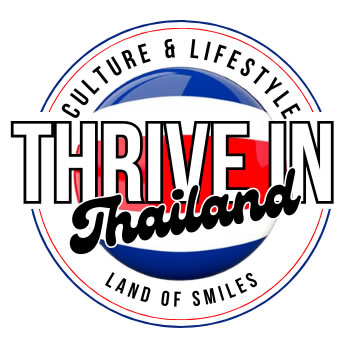
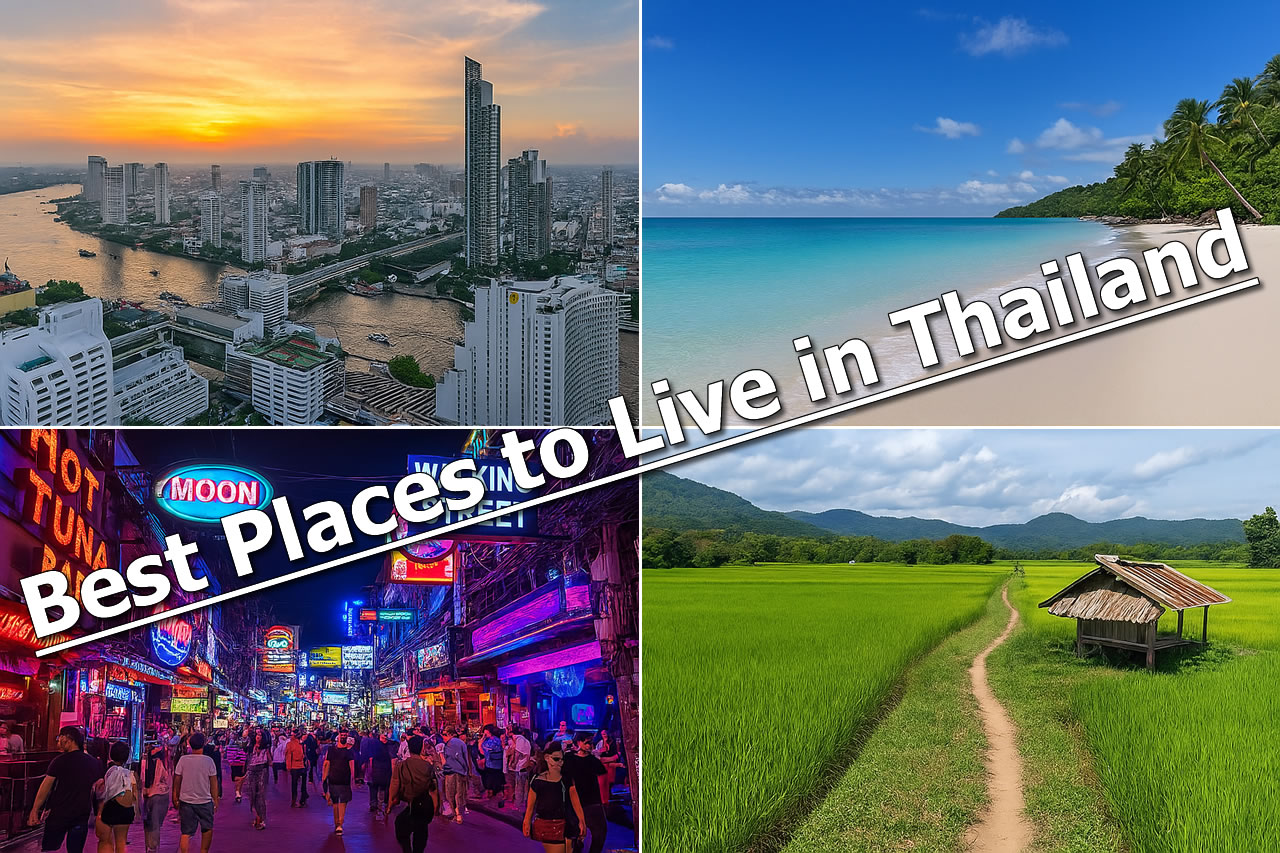
Thanks for the article, really enjoyed reading it. It gave me a good feel for some of the best places foreigners settle in Thailand. I’ve been over about eight times now and just can’t seem to stay away.
I’m hoping to retire there soon, but I’m still torn between Hua Hin and Chiang Mai. Both look great in their own ways, though Hua Hin having the beach is a big pull. My plan is to spend roughly six weeks in each spot to get a proper sense of day-to-day life before making any decisions.
If you’ve got any tips on what a retiree should look out for when choosing where to live in Thailand, I’d really appreciate it.
Thanks again for all the info.
– Conrad, UK
Hi Conrad, Thanks for your comment, and congratulations on your decision to make the move to the Land of Smiles. You are spot on with your plan to spend time in each location first!
Things to consider when choosing a location >>
• Rental prices: In Chiang Mai it’s very affordable to rent a nice house just out of town compared to a much smaller condo in town.
• Cost of living: Both places offer great value for money, and Hua Hin is surprisingly cheap, being on the coast.
• Traffic: Chiang Mai is a big city, and traffic can be heavy, especially during rush hours. Hua Hin is much smaller, and traffic isn’t such a big factor when moving around.
• Leisure activities: Chiang Mai has everything except for the beach, whereas Hua Hin is near the ocean but lacks some amenities.
• Expat communities & social life: Hua Hin is more of a retirement destination and attracts an older crowd. In Chiang Mai expats are more broadly diversified. Both places offer social activities, sports, charity organizations… It’s up to you to strike connections and make new friendships.
• Overall atmosphere: Hua Hin, being much smaller, has a slower pace and is more laid back. Chiang Mai offers city life with the feel of a big village.
I hope that provides some food for thought in your research, and I wish you all the best for your endeavor!